
[ad_1]
For those who needed to depart the nation the place you have been born and raised, what would you carry with you as you start a brand new life in a wierd place?
In fact, there are requirements to pack. However maybe there’s something that isn’t important and but in a means is simply that — one thing that will help you keep in mind your roots and maintain a contact of dwelling in your new dwelling place. It could possibly be a bodily object — or maybe one thing intangible that you simply carry in your coronary heart and soul.
Right now of unprecedented numbers of refugees — a report 27.1 million in 2021 — we needed to know what valuable possessions did refugees take with them? The photojournalists of The On a regular basis Initiatives interviewed and photographed eight refugees from totally different components of the globe. Listed below are their tales — and the tales of their cherished objects.
Notice: Within the story in regards to the Afghan refugee, the photojournalist herself is the one who fled.
From Ukraine to the U.S.
An opera singer’s beloved Ukrainian sheet music

/ Jodi Hilton for NPR
/
Jodi Hilton for NPR
Earlier this 12 months in Khmelnytskyi, western Ukraine, Olha Abakumova, an opera singer, and her husband, Ihor, a tubist, put their then-7-year-old daughter Zlata on a pile of blankets within the bathtub to sleep. If a missile have been to strike, the lavatory appeared just like the most secure place of their ninth-floor condo.
The Khmelnytskyi Philharmonic Orchestra, the place they each labored, initially closed after Russia’s invasion. A month later, it reopened and the orchestra stored having live shows, elevating cash for the warfare effort.
Olha and Ihor have been decided to stay in Ukraine even whereas lots of their neighbors fled. They believed the warfare would finish rapidly. However one starry and significantly quiet night time in March, they heard an eerie whistling sound. They quickly discovered that Russia had attacked the close by metropolis of Lviv, the place Olha had made her debut on the Lviv Nationwide Opera virtually a decade in the past. That was after they determined to go away.
Right this moment, Olha and her daughter live in a leafy suburb of Boston with Olha’s sister, Liliia Kachura, and her household. Liliia moved to the U.S. eight years in the past and now lives in Sudbury, Mass., along with her Ukrainian-born husband, Sasha Verbitsky, and their two younger sons.
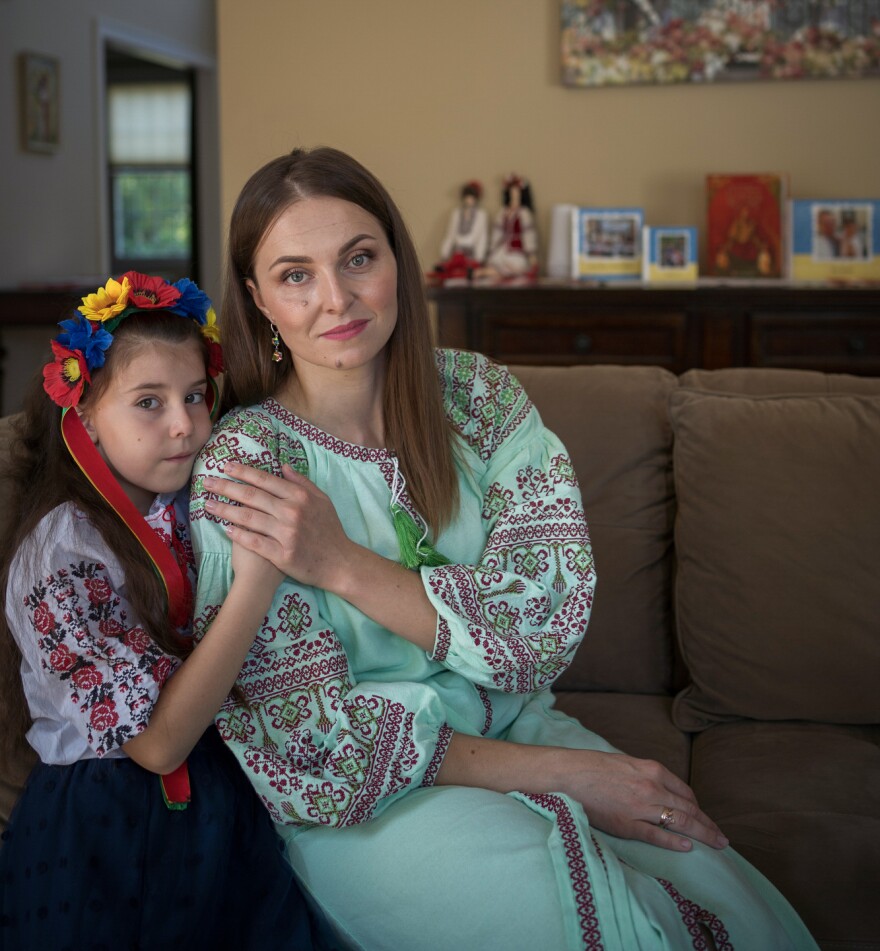
/ Jodi Hilton for NPR
/
Jodi Hilton for NPR
In late April, President Biden introduced the Uniting for Ukraine program, which permits U.S. residents to sponsor Ukrainians to come back to the U.S. When Verbitsky heard about it, he instantly referred to as Olha, encouraging her to use. Males of army age nonetheless have to stay within the nation, so Ihor would keep in Ukraine. Inside a number of weeks, Olha’s software was authorised. In Might, mom and daughter have been on a 14-hour bus journey from Khmelnytskyi to Warsaw.
Olha and Zlata carried one small suitcase. In it they put toiletries, garments and footwear. In addition they carried a number of objects with sentimental worth: Olha’s mom’s 50-year-old Vyshyvanka, a standard Ukrainian embroidered shirt; Zlata’s favourite stuffed animal, a turtle; and — most essential for Olha — as a lot sheet music as Olha may stuff inside.
“I’ve lots of totally different Ukrainian and Russian music, however after I fled, I took solely the Ukrainian arias,” says Olha. “The Ukrainian works are crucial to me. They join me with my motherland, tradition and my roots.”
When mom and daughter arrived at Logan airport in Boston, Verbitsky was there to greet them and take them dwelling. Quickly after, Olha discovered a free piano marketed on Fb. Verbitsky and Kachura organized to get the piano for Olha’s birthday. It is now within the youngsters’s playroom, the place she practices and sings along with her sheet music from Ukraine.
“After I’m singing, I see footage in entrance of my eyes,” Olha says. “The phrases and music transfer via me and take me again to Ukraine.”
Some traces, just like the final ones within the tune “My Ukraine,” carry her to tears.
You walked via thorns to achieve the dreamed-about stars.
You planted goodness in souls, like grains within the soil.
This previous August, a whole lot of Ukrainians gathered in a churchyard in Boston to have fun their Independence Day. Olha got here wearing a mint-colored Vyshyvanka. When she sang the Ukrainian nationwide anthem, folks stopped what they have been doing and stood at consideration.
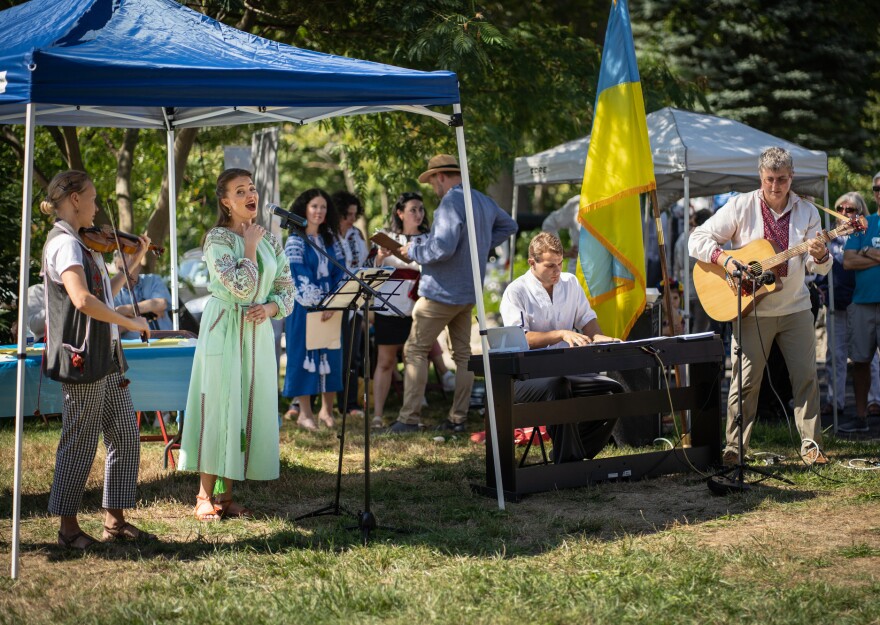
/ Jodi Hilton for NPR
/
Jodi Hilton for NPR
Her melodic voice carried throughout the churchyard, previous a jungle health club filled with taking part in youngsters, via the tents the place distributors have been promoting Ukrainian souvenirs and T-shirts. Individuals who had been heaping their plates with home made cabbage rolls, pierogis and sausages paused to hear.
In August, Zlata celebrated her birthday within the U.S. along with her mom, aunt, uncle and cousins. However her father, Ihor, may solely congratulate his daughter over video chat from Khmelnytskyi.
Olha worries about her household nonetheless in Ukraine, a few of them preventing on the entrance traces, and desires of a reunion.
“I hope the warfare will finish quickly,” she says. “I consider it’ll, however at what price?”
— Pictures and interview by Jodi Hilton
From Afghanistan to the Netherlands
A standard gown that was a mom’s reward

/ Nilofar Niekpor Zamani for NPR
/
Nilofar Niekpor Zamani for NPR
On Aug. 25, 2021, precisely 10 days after the autumn of Kabul to the Taliban, I left Afghanistan with my husband.
It was between 10 and 11 p.m. after we received a name that we needed to go to Kabul airport instantly. We left the home in darkness with out saying goodbye to the remainder of our household. We did not have sufficient time. There have been a number of Taliban checkpoints we needed to move via to get to the airport.
My husband had labored with the federal government and worldwide organizations, and I had labored with worldwide information businesses. The Taliban typically kill those that work with foreigners — we felt our deaths have been sure if we stayed in Kabul.
The climate was scorching, and town was darkish. The one working lights have been across the airport. As we received shut, I remembered a Hollywood film the place zombies assault a metropolis and the folks flee, attempting to save lots of their lives. It felt like all of the folks of Afghanistan had come to the airport to flee.
As we stood outdoors the gates of the airport, attempting to get in, the Taliban have been throughout us, taking pictures within the air. A Taliban soldier hit my husband on the shoulder with the butt of a Kalashnikov. I used to be subsequent to him when it occurred, holding his hand. We rapidly ran to the opposite facet of the road. My husband did not bleed, however he could not elevate something for the following six months. About seven hours after the Taliban hit my husband, we have been lastly in a position to enter the airport.
All I had with me was one backpack to include my entire life in Afghanistan. The airline allowed just one bag on the airplane, and I introduced as small a bag as I may. I knew that within the crowded airport, surrounded by 1000’s of individuals like me, it would not be attainable to hold something heavy.
Two days earlier than we left, I packed. I took all of my garments out of the closet and threw them on the ground to raised see them together with my different possessions.
I by no means thought I might depart them like this, shedding the dear issues of my life: My images books, which I had discovered throughout Kabul and Iran. The primary reward from my love — a purple bear from our first Valentine’s Day. I had needed to maintain it for so long as I lived. The pocket book by which I had written 15 years of my recollections. My childhood picture album.
Many of the issues I couldn’t take I gave to my kin to present to the poor. Different issues I burned, like my picture album, so they would not fall into the arms of the Taliban.
With just some items of clothes in my backpack there was no extra empty house. I needed to shut the zipper, however instantly I noticed the inexperienced gown with small pink and purple flowers that my mom had given me after my marriage ceremony.

/ Nilofar Niekpor Zamani for NPR
/
Nilofar Niekpor Zamani for NPR
It is a gown that belongs to the Hazara folks of Afghanistan, my mother and father’ ethnic group. I stared at it for a couple of minutes and with out considering I put it in my backpack. With lots of stress and my husband’s assist, we closed the bag.
I perceive right now that I could not depart the gown and the reminiscence of my mom. I did not know if I’d see her once more. I could not depart this image of my ancestors that by no means lets me neglect the place I belong.
I’ve now been in my new dwelling within the Netherlands for a 12 months. Each time I open my wardrobe and see the gown, recollections of the previous come to my thoughts. However I have never worn it — but. I plan to put on the gown for the primary time outdoors Afghanistan on the opening of my images exhibit in Amsterdam subsequent month.
— Pictures and textual content by Nilofar Niekpor Zamani
From Honduras to the U.S.
A purple diary that is an emblem — and a report — of a transgender lady’s journey
Whereas grilling meat for lunch with associates on a quiet afternoon, Kataleya Nativi Baca obtained the telephone name she’d been hoping to get for greater than a 12 months.
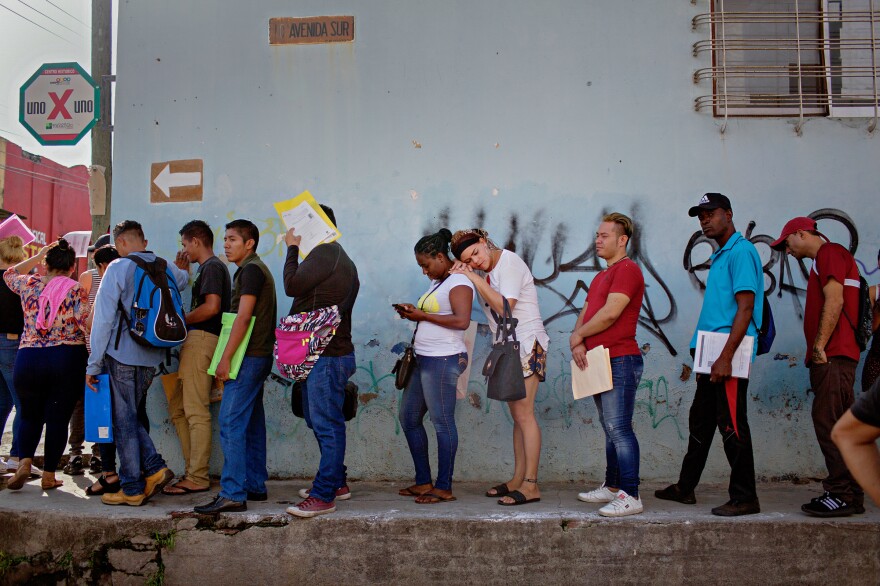
/ Danielle Villasana for NPR
/
Danielle Villasana for NPR
It was April 2021, in Tijuana, Mexico, practically two years for the reason that 31-year-old left Honduras after she says a member of the family beat her up, fracturing her collarbone.
“In my nation there is no future for [LGBTQ+] folks,” says Baca, who’s a transgender lady. “The one future we now have is demise.”
When she fled her dwelling “like a fugitive within the night time,” Baca headed towards the U.S., the place she hoped to hunt security. In San Pedro Sula, Honduras, she had suffered discrimination, threats and abuse from household, neighbors and gang members since childhood.
Baca hoped that issues could be totally different in her new dwelling. “Perhaps on the opposite facet, I can have the life I’ve by no means had in my nation,” she says.
As for Baca’s travels, she says she “would not want it on anybody.” She crossed the Suchiate River between Mexico and Guatemala after which remained in Tapachula on the southern border for a number of months. When she first arrived, she had no cash and slept on the streets. She lastly made it to Tijuana in September 2019.
When she first received to Tijuana she obtained a quantity that might give her a way of when she may be capable to formally apply for asylum and hopefully enter the USA. She thought her quantity could be referred to as round March 2020. However the borders closed indefinitely because of COVID-19 and she or he was caught in Mexico with none concept of when she may be capable to enter the U.S.
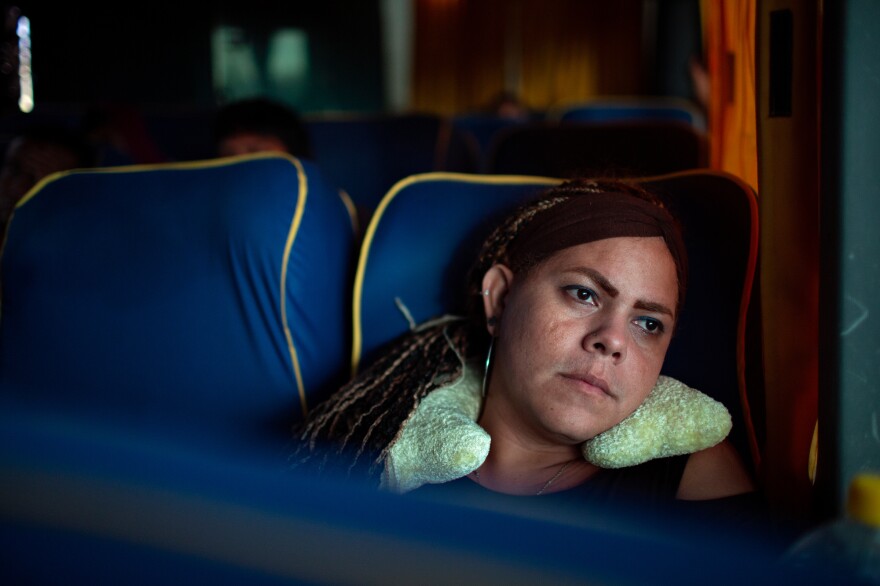
/ Danielle Villasana for NPR
/
Danielle Villasana for NPR
Baca lived in a number of shelters. In a single, she initially was pleasant with the coordinator, however as soon as she received a boyfriend “the whole lot modified” she says, and the coordinator needed her to maneuver out. On one event, the coordinator “began to yell as if a demon was inside him,” she says. He in the end hit her. Lastly, she moved in along with her boyfriend, however one among their new landlords was transphobic and threatened her. In concern for Baca’s security, her lawyer filed a humanitarian parole request to hurry up the method of getting her throughout the border.
On that afternoon in Tijuana, the second had lastly come. “You are going to enter the USA. Congratulations,” stated her lawyer’s secretary on the telephone. Crying, Baca shared the information along with her associates.
Two days later, on April 8, 2021, she walked via the San Ysidro Port of Entry between Tijuana and San Diego in the identical denims she wore when leaving Honduras. Suggested to carry one small suitcase, the one factor Baca may consider to pack apart from a number of pairs of garments was a prayer card — and her diary. Of all her possessions, the diary is most essential.
Given to her by a coordinator of an LGBTQ+ shelter the place Baca briefly stayed in Mexico, the diary has a purple cowl. It is her favourite colour.
“I’ve written most of what I’ve lived via alongside my journey up via arriving right here within the U.S.,” stated Baca, who now lives in Virginia.
It additionally consists of instructions for arriving in America, a letter to her mother about dwelling “a number of steps away from the U.S.” in Tijuana, and lyrics to a tune by Mexican singer-songwriter Marcela Gándara, starting with “It was a protracted journey, however I’ve lastly arrived.”
The diary is each an emblem — and a report — of her journey, she says: “I’ve written most of what I’ve lived via alongside my journey up via arriving right here within the U.S.”

/ Danielle Villasana for NPR
/
Danielle Villasana for NPR
Baca’s life in Virginia has not been straightforward. A transphobic landlord evicted her and she or he has struggled along with her bills. She tries to stay hopeful as she continues the asylum-seeking course of. “I desire a dignified dwelling, a household, and to succeed by myself,” she says. “I simply wish to be pleased. That is the one factor I need.”
— Pictures and story by Danielle Villasana
From Liberia to Nigeria
A passport that is 4 many years outdated
!["This passport reminds me of my past life, traveling across West Africa. There was a time I wanted to throw the passport away, but [my pastor] said I should continue keeping it," says Rebecca Maneh Nagbe, known as Mama Sckadee. After fleeing the civil war in Liberia in 2003, she came to a refugee camp in Nigeria. She has not been able to obtain legal status that would let her to leave the camp.](https://npr.brightspotcdn.com/dims4/default/9150e5c/2147483647/strip/true/crop/3000x1998+0+0/resize/880x586!/quality/90/?url=https%3A%2F%2Fmedia.npr.org%2Fassets%2Fimg%2F2022%2F10%2F19%2F2022-npr-edp-refugees-obasola_02_custom-d4095a899743dc410b3428c96eaabd46262d9ff7.jpg)
/ Ọbáṣọlá Bámigbólá for NPR
/
Ọbáṣọlá Bámigbólá for NPR
Rebecca Maneh Nagbe, popularly referred to as Mama Sckadee, is a 69-year-old Liberian refugee dwelling along with her 14-year-old granddaughter, Angel, on the Oru-Ijebu refugee camp in southwestern Nigeria. Nagbe left Liberia in 2003 throughout its second civil warfare.
“I used to be working on the Liberia Worldwide Airport and dwelling near the airport in Monrovia,” she says. “The impact of the airstrike was an excessive amount of for me to bear. It was then I made up my thoughts to search out an escape route via my church.”
Nagbe went to her church to search out shelter with different congregants. When the Nigerian authorities offered a airplane to evacuate Liberians from Monrovia, Nagbe took her 11-year-old daughter, Ajua, on the flight to Nigeria.
When Nagbe first arrived in Nigeria, she was legally thought-about a refugee. However for the previous decade she’s been in political limbo. As a result of Liberia has restored peace, in June 2012 the United Nations Excessive Commissioner for Refugees stopped relating to Liberians as refugees. Many host governments, together with Nigeria, stopped granting Liberians like Nagbe a particular authorized standing. She utilized to Nigeria’s refugee group for an exemption, however her request was rejected.
That is why Nagbe nonetheless clings to her outdated Liberian passport from 1982. She received it on the outdated immigration workplace in Monrovia and she or he’s stored it shut for 4 many years.
“I’ll all the time maintain this passport as a result of it jogs my memory of so many issues, one among which is the USA visa I’ve on it,” she says. “My Sierra Leonean boyfriend needed me to comply with him to the USA, that was why he received me the visa. Sadly, I couldn’t be a part of him on the journey.”
“This passport jogs my memory of my previous life, touring throughout West Africa. There was a time I needed to throw the passport away, however [my pastor] stated I ought to proceed preserving it.”
Whereas Nagbe favored her outdated job working on the airport in Liberia, she would not wish to return. “I don’t assume I’d ever return as a result of the final time I heard about my siblings, one among them bought off virtually all of our father’s rubber plantation.”
Nagbe had six youngsters. Considered one of them moved to the USA earlier than the second civil warfare and she or he by no means heard from him once more. “I used to be solely in a position to escape to Nigeria with my youngest daughter, Ajua. So, what am I going again to? Perhaps, if attainable, I’d go to sooner or later, however to reside in Liberia? No.”

/ Ọbáṣọlá Bámigbólá for NPR
/
Ọbáṣọlá Bámigbólá for NPR
In 2008, Nagbe’s daughter Ajua, then 16 years outdated, gave beginning to Angel. When Angel was 2 weeks outdated, Ajua left the newborn with Nagbe and traveled to Ghana searching for a greater life. Nagbe says she has not seen or heard from Ajua for greater than a decade.
“It was robust for me caring for a suckling,” Nagbe says. “A fellow refugee, [a] nursing mom within the camp, assisted in caring for Angel as a child. Angel has been my companion for 14 years and folks have proven us mercy alongside the journey of elevating her. She is all I’ve.”
— Pictures and interview by Ọbáṣọlá Bámigbólá
From a rural village to India’s “Millennium Metropolis”
A local weather refugee brings a plate and a bowl for particular meals — and choices to God

/ Smita Sharma for NPR
/
Smita Sharma for NPR
Late one afternoon after ending her family chores, Pramila Giri lay down on her mattress to relaxation subsequent to her 4-year-old son. With out electrical energy, the warmth and humidity stored her awake. It had been raining repeatedly for days due to a cyclone in her village of Pathar Pratima, an island filled with mangroves within the Sundarban area in India’s northeast. She used a hand-crafted fan to attempt to maintain her son cool.
As she was about to go to sleep, she heard a cracking sound from the ceiling. Right away she impulsively grabbed her son, then ran outdoors for security. The complete roof of her home had simply collapsed. Pramila and her son escaped with none accidents.
This incident in 2011 shocked the household. And the devastating cyclone was not a uncommon occasion. Scientists have discovered that cyclones hitting India are extra intense due to local weather change.
Pramila, 33, and her husband, Sukhdeb, 42, who wasn’t dwelling on the time, determined emigrate north to Gurgaon, additionally referred to as India’s “Millennium Metropolis.” The quickly rising metropolis bordering the capital of Delhi has a number of high-rise housing complexes, enormous malls and workplace complexes.
“After we migrated to Gurgaon we had no jobs, no supply of earnings and no shelter,” says Pramila. “The cyclones, rising sea stage and salinization of soil had wreaked havoc in our lives. Earlier we used to have three paddy harvestings in a 12 months that took care of our wants. We have been by no means wealthy, however neither have been we struggling to outlive. Now there may be solely a single harvest in a 12 months.”
Right this moment Pramila is not a farmer. She works as a cook dinner at varied homes in one among Gurgaon’s condo complexes. She begins at 6 within the morning when she prepares breakfast for a household earlier than they depart for varsity and work. She will get a number of hours’ break within the afternoon, then works in one other 5 residences and finishes her day at 8 within the night. She earns about $300 monthly.

/ Smita Sharma for NPR
/
Smita Sharma for NPR
Her husband works as a plumber in the identical condo complicated. He earns about $200 a month. A bit of their earnings goes towards hire for his or her crowded one bed room in Gurgaon. However they ship many of the remaining a reimbursement dwelling to their village. They’re rebuilding their home and paying for his or her son’s schooling.
Supriyo, now 15 years outdated, lives along with his grandmother within the village. His mother and father keep in contact via telephone and video chats. His mother has plans to carry him to Gurgaon in a number of years for school, however they could not have him reside with them initially as a result of they could not afford day care.
Pramila’s 3-year-old daughter, Shilpa, was born in Gurgaon and lives with them. When Pramila and her husband are at work, her next-door neighbors — additionally a migrant household and from the identical area — take care of her daughter without cost. “I’m very fortunate to have the help of my neighbor,” Pramila says. “They’re like my prolonged household. It’s due to them [that] I’m able to work and be out of the home for such lengthy hours.”
Aside from {a photograph} of her son, the one different objects Pramila carried along with her from again dwelling are a plate and bowl fabricated from bronze, regionally referred to as kansa. She makes use of the plate and bowl solely on particular events and festivals for choices to God. Often they put rice pudding within the bowl, and for the plate they put some khichdi, a salty lentil porridge.
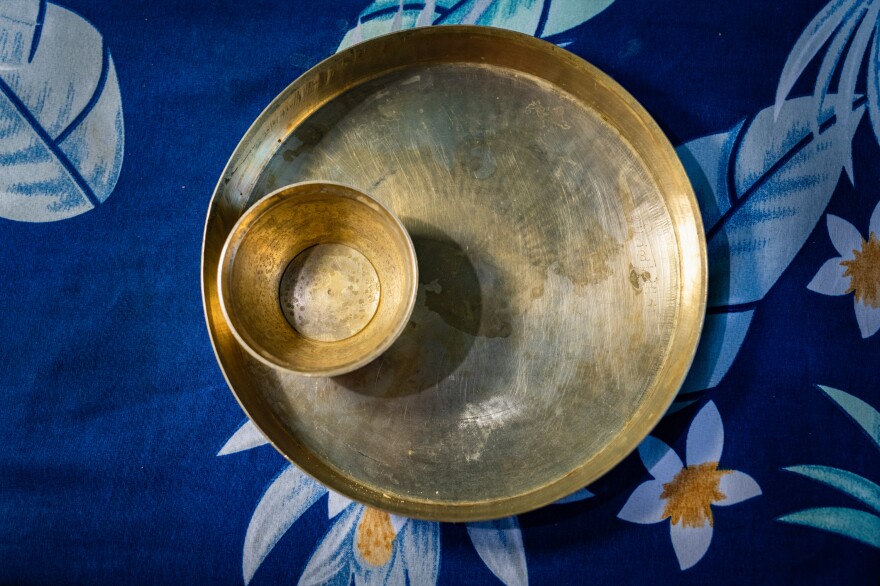
/ Smita Sharma for NPR
/
Smita Sharma for NPR
“To be very trustworthy I do not miss my life from again within the village,” she says. “Though we now reside in a cramped one-room home, we nonetheless have relative peace of thoughts.”
“I used to dread excited about the floods, storms and dwelling with out the naked requirements akin to ingesting water and electrical energy for days [on] finish,” she says. “I’ve freedom right here. I’m able to earn and never be depending on anybody.”
Pramila says her daughter is simply too younger to grasp “the realities of our hardships,” however she hopes to take the 3-year-old dwelling to go to subsequent 12 months so she will be able to see the life they left behind.
— Pictures and interview by Smita Sharma
From Tibet to Kashmir
The style of momos: steamed or fried dough full of minced meat or greens

/ Showkat Nanda for NPR
/
Showkat Nanda for NPR
A younger Kashmiri man enters the restaurant shouting, “Kareema!” It is a pet title utilized by a few of the younger prospects for his or her beloved restaurant proprietor, Abdul Kareem Bhat.
Bhat smiles because the younger man orders a plate of conventional Tibetan beef dumplings referred to as momos.
Bhat, 68, is one among 1000’s of Tibetan refugees whose households fled Tibet and settled in Kashmir following a failed rebellion in opposition to China in 1959. Now his restaurant, Kareem’s Momo Hut, is among the hottest momo joints in Srinagar, Kashmir’s summer time capital that is additionally referred to as Kashmir’s “Metropolis of Lakes.”
Bhat’s household is Muslim. He says when the Chinese language communist authorities took energy within the Nineteen Fifties, some Muslims have been put in jail. Bhat’s household got here to Kashmir partially as a result of it is majority Muslim.
Bhat was about 8 years outdated when he and his household first arrived in Srinagar. At first they lived in tents erected by the authorities on town’s largest Muslim prayer floor, the Eidgah. The locals weren’t welcoming, says Bhat.
“They thought we have been Buddhists from Ladakh,” he says. “I keep in mind a gaggle of Kashmiri folks attempting to forestall us from organising extra tents. All of a sudden one among our elders got here within the open and browse the Adhaan, the Muslim name to prayer. The hostile crowd was shocked to know that we have been Muslims and their habits immediately modified. What adopted have been hugs, kisses and tears. For the following few days it was these individuals who organized meals for us.”
Ever since then, Bhat says he is by no means felt like an outsider. “We think about ourselves Kashmiris.”
Many Tibetans who got here to Kashmir within the Nineteen Fifties and early Sixties have died. Solely a handful of older folks like Bhat keep in mind the journey from Lhasa, the Tibetan capital, to Kashmir. When he thinks of Tibet, he thinks of a faraway land. His early impressions of that area got here from his mother and father’ bedtime tales.
As a result of he was younger when he left Tibet, he felt that many ties to the nation have been snapped. However the factor that loomed massive in Bhat’s creativeness as a younger boy was the meals he ate in Tibet. Of their new dwelling they nonetheless ate momos, steamed or fried dough full of minced meat or greens, typically with scorching sauce. They usually ate tsampa, a sort of cereal typically made with roasted barley flour and eaten with tea, and thukpa, a standard noodle soup with herbs.

/ Showkat Nanda for NPR
/
Showkat Nanda for NPR
When Bhat was a youngster, he determined to assist the neighborhood elders who have been attempting to popularize these meals in Kashmir. This endeavor ended up being each a option to earn a livelihood and a option to keep linked to his roots.
“It did a further factor [too],” Bhat says. “It introduced us nearer to our Kashmiri brothers.”
Bhat began his personal small restaurant within the late Nineteen Eighties. Again then most of his prospects have been from his personal neighborhood. “Initially, Kashmiris did not like these meals in any respect. They’d be repelled by the considered noodles as a result of they’d examine them with earthworms,” he says with a cackle.
However right now, he says, momos and different Tibetan dishes are fashionable. With 400 to 500 prospects a day at his restaurant, together with many Kashmiris, he says the meals “has bonded us collectively.”
Bhat says ever since he began promoting momos, he is by no means needed to do anything in his life. “Serving momos has not simply been a enterprise for me,” he says. “I believe by treating my prospects, whom I think about friends, in a pleasant means, it offers me a wierd satisfaction.” If he retains doing this work, Bhat says, he can die pleased.
— Pictures and interview by Showkat Nanda
From Guatemala to Mexico
The phrases of Ok’iche’, her native Mayan language

/ James Rodríguez for NPR
/
James Rodríguez for NPR
Rosa Gonzalez, 54, was born in Quiché, a mountainous area of Guatemala the place tiny villages dot valleys and plateaus hover 6,000 ft above sea stage. Within the foothills of the imperious Cuchumatanes peaks, Rosa spent her early childhood herding cows and sheep alongside ravines and throughout streams.
Again then, Rosa did not go to highschool. Most of her household and associates have been illiterate and spoke solely their native Mayan language referred to as Ok’iche’.
However within the mid-Nineteen Seventies, her mother and father — like so many different households from the Western Highlands of Guatemala — packed up and trekked eastward towards the tropical lowlands of Ixcan. The federal government had a program offering landless campesinos, or rural agricultural staff, with land within the jungles bordering Mexico.
The brand new settlements emphasised schooling and solidarity. Rosa discovered to learn and write in Spanish, the native economic system was flourishing, and optimism was excessive.
However with its well-organized communities and distant setting, Ixcan in the end grew to become a springboard for the newly fashioned Guerrilla Military of the Poor. Within the early Nineteen Eighties, the Guatemalan army tried to destroy the guerrillas’ help base with scorched earth campaigns, razing total villages. About 200,000 have been killed in a 36-year battle, and most have been Indigenous. Rosa’s household fled to Mexico together with roughly 100,000 different Guatemalans.
After the Guatemalan authorities and guerrilla forces signed a peace settlement in 1996, a majority of the refugees in Mexico returned dwelling. Rosa, who by now was married with youngsters, begged her husband, Lucas, to stay in Campeche, Mexico.
“I noticed the Xib’nel in Guatemala,” Rosa says in Ok’iche’. Xib’nel is a legendary determine, akin to a feminine Grim Reaper, and introduced on a fright and terror that also haunts her. “After I crossed the river into Mexico,” Rosa says, “I stated goodbye to my disappointment.”
“However,” she stresses, “I can always remember my land.” She has no bodily keepsakes to remind her of her childhood dwelling however does have one prized possession she all the time carries along with her: her language of Ok’iche’. Rosa’s 29-year-old daughter Ana María Chipel Gonzalez was born in Mexico however speaks Ok’iche’ practically fluently.

/ James Rodríguez for NPR
/
James Rodríguez for NPR
“Our languages and Guatemalan heritage are basic to who we’re,” says Ana María, who traveled to a close-by metropolis to get a grasp’s diploma in tax regulation and has served as a consultant in Mexico’s Nationwide Institute of Indigenous Peoples. Mom and daughter each promote the preservation of their tradition, together with prompting native youth to put on conventional Guatemalan clothes.
It is regular to listen to Ok’iche’ and different Guatemalan Mayan languages on the streets of Santo Domingo Keste, the tiny Mexican city the place Rosa and Ana María and different refugees from Guatemala reside.
Ana María thinks of the Guatemalan neighborhood in Santo Domingo Kesté as an emblem. “The mere existence of Kesté reveals our resilience, unity and bravado as a folks. We should always remember this.”
Ana María now has a brand new child, Luca, and says she’s going to educate him the whole lot she is aware of about her mother and father’ tradition — particularly the Ok’iche’ language. As for what Ana María thinks is an important phrase in Ok’iche’? “Nu wara’b,” she says. It means “my root.”
— Pictures and interview by James Rodríguez, whose work is supported by a FONCA grant
From Yemen to Ecuador
Incense stones made by his grandmother
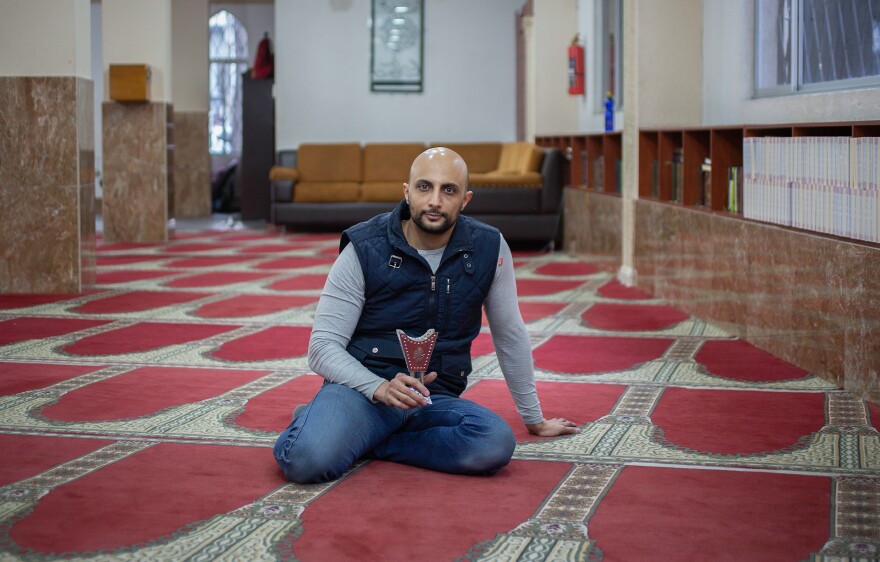
/ Yolanda Escobar Jiménez for NPR
/
Yolanda Escobar Jiménez for NPR
Nader Alareqi is initially from Sanaa, the capital of Yemen. However for the previous decade, the nation has been within the midst of a civil warfare. In 2015, Saudi Arabian forces started bombarding Yemen, and that is when the 35-year-old knew he wanted to go.
“It was crucial to go away my nation as a result of [the war] was not life,” he says.
In July 2015, Alareqi and his spouse left Yemen. They first moved to Egypt, the place they’d a toddler. However Alareqi did not wish to keep due to the financial scenario there.
Alareqi had heard from a number of associates that Ecuador was one of many solely nations the place he would not want a visa to enter. Alareqi, his spouse and baby all traveled to Quito, Ecuador, in June 2016.
When he was packing to go away Yemen, Alareqi knew he needed to carry one thing particular from his tradition. He introduced some particular meals and spices. (In reality, he now sells Arabic meals and spices at an Arabic meals product retailer in Quito.)
However he additionally introduced one thing else, bakhoor. In Arabic, bakhoor means fumes, and throughout the Arabian peninsula, folks gentle it like incense. “You gentle them on fireplace for a great odor in your home,” Alareqi says.
Alareqi’s grandmother made bakhoor herself, a combination of perfumes and scented leaves. She would combine them, warmth them, and depart the liquid to dry for days. “Those I’ve now have been saved for greater than 5 years. The odor would not change,” he says. “My grandmother did it only for my household — not as a enterprise. These are very particular stones made with love.”
Alareqi says that though bakhoor is fashionable in Arab nations, in his opinion, his grandmother’s is the very best. She used a secret recipe with a big assortment of perfumes and herbs. Alareqi says the odor of lit bakhoor transports him again to Sanaa.
“It smells similar to my grandmother’s dwelling,” he says. “I maintain remembering the outdated days after I was a child and I stayed at her dwelling.”
Because the eldest grandchild, he says, he was his grandmother’s favourite. “She was my mother and extra,” he says. “I lived along with her greater than with my mother and father.”
Two years in the past, Alareqi was driving to work when he received a name from Yemen. His grandma had died of a coronary heart assault.
“I finished within the fuel station and actually I cried for about half an hour,” he says. “After that I stayed within the automotive for 2 hours. I did not know the place to go and what to do.”
“That day I began to grasp why folks informed me that coming to the West could be troublesome,” he says. “I now consider them.”
And he believes that the aroma from lighting the stones works a type of magic: When he lights the bakhoor, he seems like he is again in his grandmother’s home.
— Photographs and textual content by Yolanda Escobar Jiménez
Inform your story
We might like to listen to extra tales in regards to the objects that migrants have introduced with them for sentimental causes. When you’ve got a private story to share from your individual expertise or your loved ones’s expertise, ship an electronic mail to [email protected] together with your anecdote and with “Valuable objects” within the topic line. We might comply with up and ask for {a photograph} so we are able to characteristic extra such accounts in a future story on NPR.org.
Extra credit
Visuals edited by Ben de la Cruz, Pierre Kattar and Maxwell Posner. Textual content edited by Julia Simon and Marc Silver. Copy enhancing by Pam Webster.
Copyright 2022 NPR. To see extra, go to https://www.npr.org.
[ad_2]
Source_link